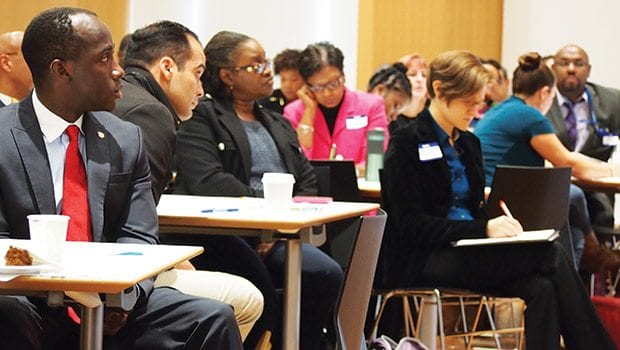
Government officials and activists from the nonprofit sector came together last week to explore ways to combat racial inequality in Boston during a day-long conference in Dudley Square.
While conference participants rolled up their sleeves and discussed innovative ways to level the playing field for people of color and women in city government, city officials — including Fire Commissioner Joe Finn, the city’s chief diversity officer and Health and Human Services chief — discussed their efforts to bring progressive change to a city long known for its entrenched tribalism.
“The racial inequalities that plague our city are a detriment to us all,” said Shaun Blugh, Boston’s chief diversity officer.
The conference, titled “Advancing Racial Equity: The Role of Government,” was sponsored by the city of Boston and a coalition of housing, health and civil rights groups. Training sessions on advancing racial equity were led by Glenn Harris, president of the New York-based Center for Social Inclusion and Julie Nelson, director of the Seattle-based Government Alliance of Race and Equity.
Nelson noted that the current national climate, with increased media coverage of police abuse and fierce anti-immigrant rhetoric in the Republican presidential primary, creates an opening for more substantive conversations about race bias.
“In some ways, what we’ve done is to normalize racial inequalities,” he said. “We have to have a greater sense of urgency.”
Nelson said that the city of Seattle’s contract work with minority- and women-owned businesses shrank to just 3 percent after Washington voters passed a 1998 ballot initiative that prohibits the state from considering race in student admissions, employment or contract awards.
Because white-owned businesses are older and larger than most minority- and woman-owned businesses, the latter firms had difficulty competing for state and city contracts. Nelson said Seattle began breaking contracts into smaller pieces to make it easier for those firms to compete — a race-neutral policy that saw Seattle’s contracts with minority- and woman-owned businesses shoot up to 30 percent.
“We focused on the results,” she said.
Nelson said city officials should start by considering the desired results when planning inclusionary policies, while keeping in mind unintended consequences.
Results-driven strategy
“Look at who benefits from decisions and who loses,” she said. “Government makes decisions that impact people of color. If there’s a decision that impacts people in different ways, we have to consider how we make that decision.”
While some in city government are working to increase diversity and expand opportunities for people of color, city officials still face thorny issues. Blacks, Latinos and Asians are under-represented in the police and fire departments, particularly in the upper ranks. And ten years after consent decrees mandating that those departments consider black and Latino candidates for hire, incoming classes of police and fire recruits are consistently more than 90 percent white.
In Boston city government, Mayor Martin Walsh has assembled a diverse team of department heads, but there are few Latinos leading city agencies.
At the same time, members of Walsh’s staff are working on race disparities in the city — including the so-called achievement gap between white Boston Public Schools students and students of color and the city’s My Brother’s Keeper initiative, aimed at improving life outcomes for black and Latino teens and young men.
“We’re working on policies that address inequality across the city,” said Janine Anzalota, the city’s newly appointed head of the Office of Fair Housing and Equity.
Anzalota said her office is looking at racial inclusion policies that have worked to expand access in other cities.
“There are best practices in cities like Seattle we’d like to look at, ranging from how they’re hiring to how they’re filling potholes,” she said.
Atyia Martin heads the city’s resilience initiative — an externally-funded effort aimed at ensuring the city is able to bounce back from natural disasters, terrorist incidents and other stressors. She says racial disparities in health, education and income can affect how the city as a whole is able to recover from shocks.
“Looking at the role of government in addressing inequality is at the core of our resiliency strategy,” she said. “The ultimate goal of this position is to design and implement a resilient strategy for the city of Boston. They way we’re addressing it is rooted in equity.”
Martin said she considers racism to be a “chronic stressor” that can affect the city’s ability to rebound from shocks.
“The people who suffer before a disaster are disproportionately impacted after disasters,” she said.







